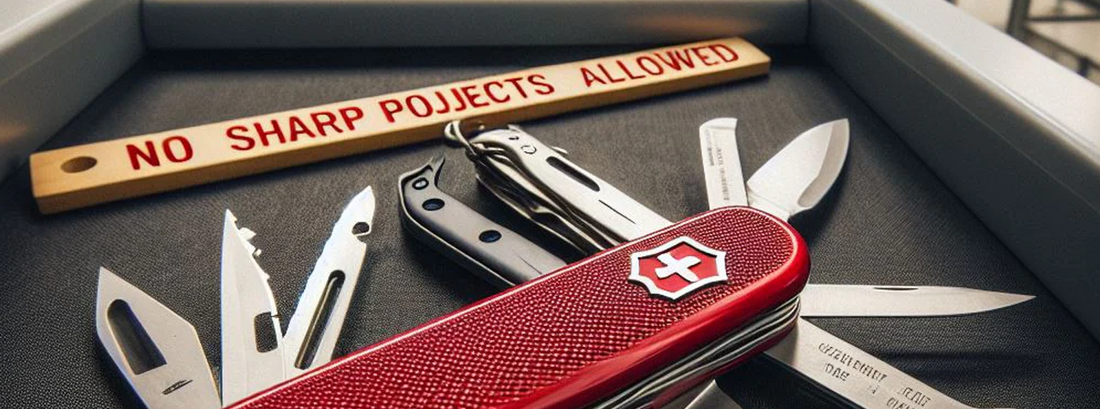This is the 30th blog of the Victorinox Swiss Army Knife blog series. You can check the other blogs I wrote from here: https://sakparts.com/blogs/everything-about-victorinox-swiss-army-knife
Are There Any Restrictions on Carrying Swiss Army Knives in Certain Places?
By Castor S. Benin
Tactical Gear Contributor | Based in Bozeman, Montana
Carrying a Swiss Army Knife might seem harmless to most knife enthusiasts, but depending on where you are, it can land you in legal trouble. Understanding restrictions on carrying these multi-tools can save you from unwanted surprises. Whether you're a daily carrier, traveler, or collector, knowing the boundaries is just as important as owning the tool itself.
🔐 Why Legal Restrictions Exist
While SAKs are practical, many jurisdictions regulate knives under broad weapons laws. Most of these laws focus on blade length, locking mechanisms, or intended use. Authorities aim to balance public safety without criminalizing tools used for utility, which is why these restrictions vary widely depending on geography and context.
🌍 Country-by-Country Overview
Here’s a look at how different countries approach SAK-type tools:
🇺🇸 United States
In most U.S. states, carrying a non-locking multi-tool with a blade under 2.5–3 inches is legal. However, regulations differ in states like New York, California, and cities like Chicago. Carrying on school property, federal buildings, or airports is strictly prohibited.
Find current U.S. state knife laws here.
🇬🇧 United Kingdom
UK law prohibits carrying a blade longer than 3 inches in public without a valid reason. Even with a smaller blade, police can still question intent. Locking blades, even if short, are considered illegal to carry.
🇨🇦 Canada
SAKs are generally legal, but customs can restrict entry if tools appear "designed for concealment" or flick open easily. Carrying for self-defense is illegal.
🇦🇺 Australia
Knife laws are strict, and even Swiss-style tools may be confiscated if carried without a genuine reason. In states like Victoria, carrying in public without cause is prohibited.
✈️ International Airports
Airports worldwide prohibit carrying knives through security, even if the blade is under the size limit. Always pack it in checked luggage.
🏫 Places Where Knives Are Always Prohibited
Even if the laws are lenient, these locations are typically off-limits:
- ✈️ Airports (carry-on bags)
- 🏫 Schools
- 🏛 Government buildings
- 🏟 Sporting events
- 🚉 Public transport hubs in some cities (e.g., London Underground)
Know the location rules before you carry. If you’re unsure, it’s best to leave your tool at home or pack it away securely.
💼 Everyday Carry & Valid Use Cases
If you’re carrying a knife daily, have a reason:
- Opening packages (carry at work with employer knowledge)
- Outdoor recreation (camping, fishing, etc.)
- Tool-based professions (plumbers, electricians, etc.)
When traveling internationally, always research local laws ahead of time. This prevents confiscations and fines.
🛡️ Protect Yourself: Best Practices
- 📜 Research local laws before traveling
- 🔒 Avoid carrying in high-security zones
- 🧾 Keep receipts or proof of tool use (can help show intent)
- 🗣 Be respectful if questioned by authorities
Knowledge is your first line of protection when carrying utility blades.
🔧 Product Tip
If you're replacing parts on your knife to reduce weight or customize it, consider how those changes may affect its legality. For instance, adding a locking blade might make it illegal to carry in countries like the UK. Stick to tools and scales that retain your knife’s compliant profile.
High-quality parts can be found at www.sakparts.com, built for function without compromising your safety or the law.
❓ Frequently Asked Questions
Q: Can I bring my knife into national parks?
A: In most cases yes, but check the park's official site—some areas with federal jurisdiction may restrict weapons.
Q: Can I carry my knife in my car?
A: Yes in most jurisdictions, but don’t store it in an accessible area during stops—especially near schools or federal zones.
Q: What about festivals or concerts?
A: These are usually weapon-free zones. Security will likely confiscate knives at entry points.
🧭 Final Thoughts: Be Informed, Not Sorry
A pocket knife is one of the most useful tools around—but it comes with responsibility. Laws around the world treat them differently, and ignorance won't be a valid defense if you're stopped.
🔍 Always research, prepare, and when in doubt, leave it at home or check it in. Being a responsible carrier ensures you continue to enjoy the benefits of your knife while staying compliant with the law.
Got questions or have a story about carrying your tool in a tricky spot? Drop it in the comments below ⬇️
Let me know what you'd love to read about in next week’s blog — I’m always happy to cover topics that help fellow knife enthusiasts stay informed and ready. ✨

